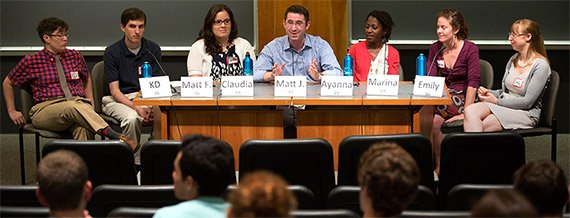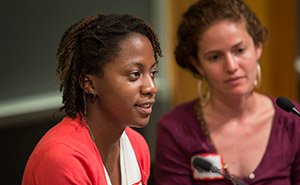Exploring Liberal Arts Careers

Matt Jacobson ’97 graduated from Swarthmore with a major in biology, after which he continued his undergraduate research at Rockefeller University with fellow alumnus Fred Cross ’78. Next came medical school, which led to a pediatrics residency at New York Presbyterian Hospital. But being a doctor didn’t feel quite right, so Jacobson began working on Wall Street as a biotechnology and pharmaceutical equities analyst, researching and sometimes investing in companies developing new drugs. Most recently, he retired from Wall Street and enrolled at an Episcopal theological seminary with plans to become an Anglican priest. (His wife, Meredith Linn ’97, is an archaeology professor at Barnard College.)
Jacobson’s many stops on a career journey that is not even halfway through testify to the varied opportunities available to Swarthmore alums, particularly those graduating with degrees in the natural sciences and engineering. He was the “most senior” of seven young alumni who returned to their alma mater earlier this month to comprise the Natural Sciences and Engineering Alumni Panel, at which panelists shared their experiences and wisdom with current students, who have remained on campus to pursue summer research projects. The yearly event is funded by a grant from the Howard Hughes Medical Institute.

For some of the panelists, the post-Swarthmore career path has been a bit more conventional than Jacobson’s. After earning a Masters in Education degree at the University of Pennsylvania, KD Davenport ’05, a biology major while at Swarthmore, began teaching biology at Central High, a public academic magnet school in Philadelphia. “I love teaching young people what I know about biology,” Davenport said. “Ten years from now, I want to be doing exactly what I’m doing now, except I want to better at it.”
Panelists included Matt Fiedler ’06, a math and economics major at Swarthmore who now works in the Obama administration as a senior economist for the Council of Economic Advisors; Marina Isakowitz ’09, who last year helped found the Science Leadership Academy at Beeber, a project-based, inquiry-driven public school in West Philadelphia; Ayanna Johnson ’09, a health policy manager at the National Consumers League; Claudia Munoz ’99, a lead knowledge analyst at the Boston Consulting Group; and Emily Ullman ’06, a graduate of Harvard Law School and now an attorney working out of Washington, D.C. for the firm Covington & Burling LLP.
Panelists addressed topics ranging from courses they wish they would have taken at Swarthmore and the benefits and challenges of the Honors program to the importance of networking and their successes and failures related to achieving “work-life balance.” Ullman said she wishes she would have taken statistics at Swarthmore while Johnson said she regrets not taking advantage of opportunities to study abroad. But all maintained that their Swarthmore educations have served them well in their graduate schooling and their careers. “I’ve been fortunate to be able to work in a field that combines my interest in public policy and my interest in working with numbers,” Fiedler said.

In contrast to previous generations, when individuals spent an entire career at one or perhaps two jobs, today, according to the U.S. Bureau of Labor Statistics, the average American changes jobs 10 to 15 times between the ages of 18 and 46. This being the case, biology professor Elizabeth Vallen, who moderated the event, stressed the importance of developing skills and abilities that maintain their importance regardless of how crooked a career path might be. Whereas job markets in previous generations required mastery of one skill, all indications are that the job market of the future will require critical thinking across disciplines. As futurist Alvin Toffler puts it, “The illiterate of the 21st century will not be those who cannot read and write, but those who cannot learn, unlearn, and relearn.”
Vallen cited a report from the President’s Council of Advisors on Science and Technology, which states that over the next decade U.S. colleges and universities will have to produce one million additional STEM (Science, Technology, Engineering, and Math) graduates than are being turned out at the current rate if the U.S. is to retain its historical preeminence in science and technology. The job market for STEM graduates (which includes non-STEM jobs that nevertheless require STEM skills) is expanding rapidly. Those best suited to fill job openings in STEM-related fields, according to Vallen, are those “with strong communication and writing skills and those who have been prepared to view problems from across the disciplines.”
“One of our most important educational goals at Swarthmore is teaching students how to learn,” Vallen says. “This is something that will serve them well in their careers and in their lives.”


